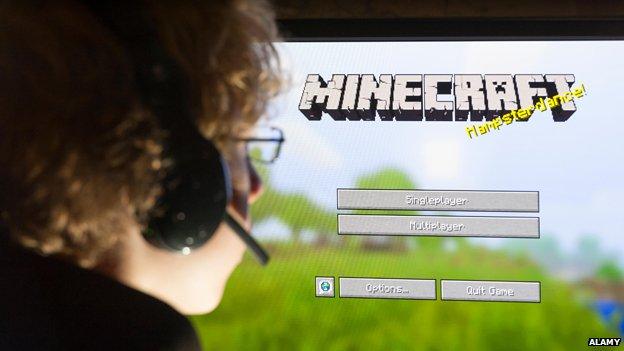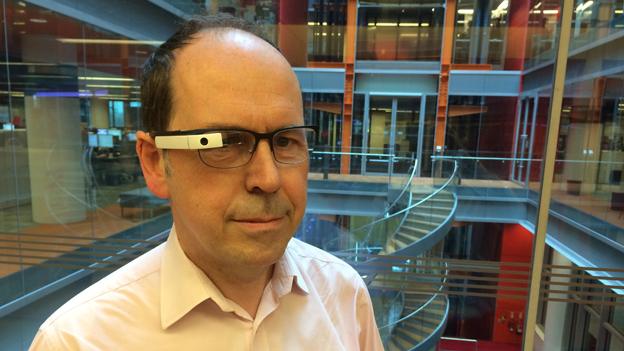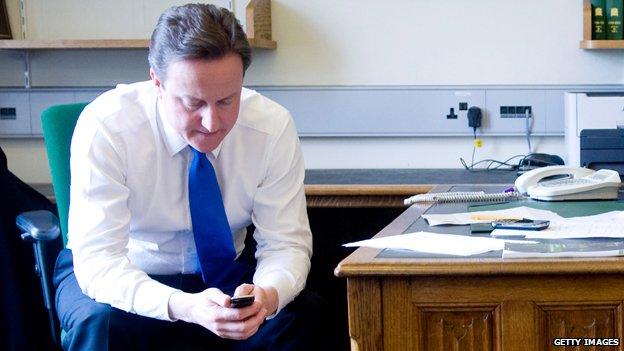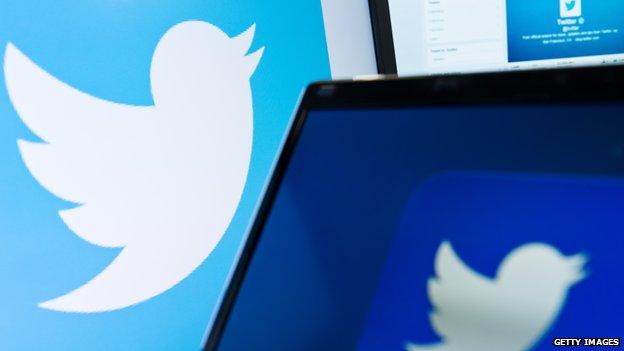The 12 tech months of 2014
- Published
- comments
Several technology companies launched a smartwatch in 2014
Technology has taken some giant leaps forward this year - and also a few steps back.
It's been the year when wearable technology, driverless cars and drones all took the imagination. But we've also seen a wave of security scares, hack attacks and all sorts of cybernastiness which have made us question just how positive a force the internet has been in our lives.
I've been sorting through the archives of this blog to try to draw a picture of the year:
This was the year when the idea that we need to change the way children engage with technology really took off. It seemed every month brought a new coding initiative - there were Code Clubs and Coder Dojos, years and hours of code. In England, schools were gearing up for a revolution with a new curriculum which meant children would start learning to program from the age of five. This blog post asked whether teachers would be ready in time.
February: How fast will TV change?
This year the long promised revolution in TV viewing gathered pace. We saw more evidence of a switch to online services like Netflix, and it seems that the digital generation is now far more inclined to watch YouTube than tune in to traditional TV. But figures show the average British household still watches nearly four hours of good old fashioned broadcast TV a day. The big question - will Generation X grow up and learn to slump in front of the telly like Mum and Dad?

In March, Facebook bought the virtual reality headset pioneers Oculus Rift - to howls of anguish from some who felt that the social network was now a big bad corporation rather than an edgy upstart. These included the Minecraft founder Markus "Notch" Persson. A few months after his own business Mojang was sold to Microsoft for $2.5bn, and he has recently moved into a Beverly Hills mansion.
Both Facebook and Microsoft have decided that if they are going to keep innovating, paying outlandish prices for smart young companies may be the way ahead.
April: Mobile money - ready for lift-off?
Mobile payment systems have been the next big thing for quite a while. This year saw a number of innovations, from Paym, which links your phone to your bank account, to some rather eccentric contactless payment gloves trialled by Barclaycard just before Christmas.
In the US, Apple Pay seems to have made quite rapid headway, and may arrive in the UK in 2015.
But the innovation which may at last make cash redundant is rather more mundane. The contactless debit card really took off in 2014, making it simple to buy a sandwich or travel on London's Underground with just a tap.

This was supposed to be the year wearable technology took off - but we end 2014 with the leading innovation in this field already looking a bit of a dud. Google Glass is very clever, but as I found when wearing it for a couple of months, it makes its users look daft. Technology firms are learning the hard way that new gadgets need to be fashionable as well as functional.
June: Silicon Valley - still disrupting the world
On a visit to San Francisco I found ample evidence at the crowdfunding site Indiegogo and the car service Uber that Silicon Valley is still producing ideas that disrupt the status quo. Uber - now valued at $40bn - has been the year's most controversial and successful tech firm, attracting more hate than love as it barges its way through regulatory barriers. "There's a mentality here about changing the way things are done, not believing the norm has to remain forever," one senior Uber executive told me, "and that's a pretty damn healthy way of seeing the world." Not everyone likes that change - expect more pushback against Uber in 2015.

Difficulty getting a signal?
At home, the big issue for many consumers is how to get online and stay connected. Mobile phone coverage got better and faster as 4G networks were rolled out - but for many people, especially in rural areas, it was still far too patchy. The government put pressure on the mobile phone operators to introduce something called national roaming, where customers would be able to switch to another network in areas where coverage was bad, The operators hated that idea - and in December a compromise was reached which saw them promise to bring coverage to 90% of the UK landmass. But don't expect the complaints to subside - a mobile connection is now seen as essential as running water or electricity.
August: Teenagers and the news game
Just as the digital generation has gone off boring old broadcast TV, teenagers don't read newspapers or watch news bulletins. But never fear - they are getting news about events that interest them from all sorts of new sources, from games forums to social networks, from Buzzfeed to Vice. The trick for old media organisations - and ageing journalists - is to find new ways of engaging these young people and to make them pay for news.
Proving you are who you say you are is going to become ever more important as more goods and services, from banking to benefits, go online. The UK government, which prides itself on being a pioneer in e-government, is trying to crack this problem by introducing an online identity verification system. But as I found when I tried out Verify - still very much at the experimental stage - there are all sorts of technology and trust issues which need to be sorted out .

The web promised a new era of free expression, and social networks seemed at first to give everyone a voice in public debate. But those dreams are fading fast as the likes of Twitter and Facebook become noisy, sometimes hateful arenas for anyone with a cause to promote or an enemy to pursue. The new director of GCHQ described the networks as the "command and control systems" for terrorists, and those targeted by trolls demanded swifter action to deal with them. Meanwhile, finding any online forum where people could debate without resorting to insults and abuse got harder.
November: Nokia - still a mobile force?
It has been a year of turmoil in the world of mobile connectivity. Samsung has stumbled, caught out by the rise of Chinese newcomers like Xiaomi and the power of Apple's brand. Blackberry brought out two new phones, the Passport and the Classic - but still looked likely to survive only as a niche player for the nostalgic keyboard lover. Microsoft completed its takeover of Nokia's mobile business but still struggled to make much impact with Windows Phone. A surprise then when Nokia - the Finnish remnant, that is - unveiled a new tablet. Can the company which had 40% of the mobile market stage an unlikely comeback? Or is the Nokia brand now just too confusing for consumers to bother with?
December: Hawking and the end of the human race
Never mind mobile phones and wearable gadgets, let's end the year with the big picture - the future of the human race. Artificial Intelligence is going through a boom at the moment, with machines learning to do everything from drive cars to translate languages instantly. The cosmologist Stephen Hawking looked into the future, and speculated that computers which could evolve faster than humans would render us obsolete. Still, on the bright side, this is unlikely to happen in 2015. Happy New Year to all of you.